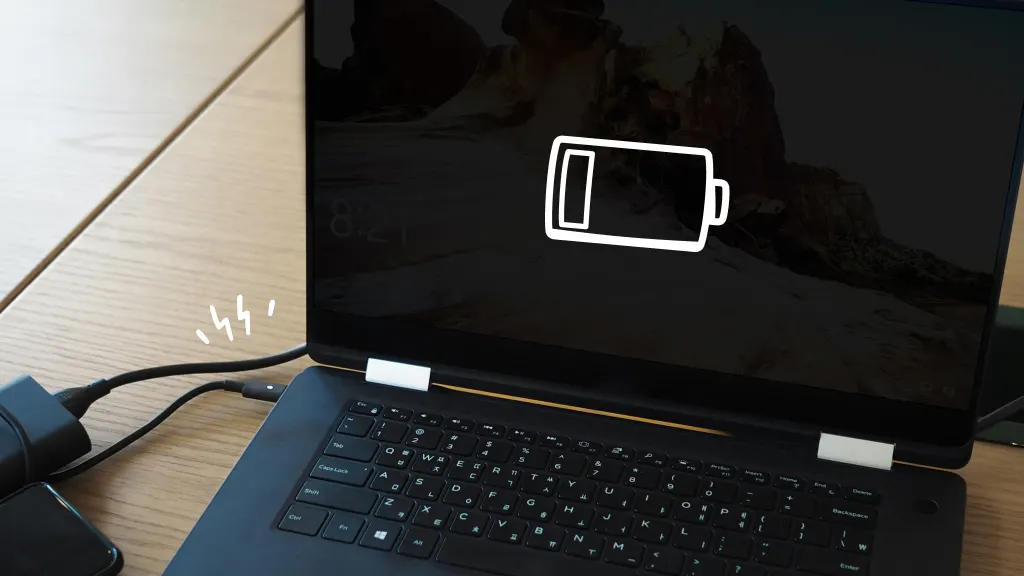Troubleshooting tips for Dell XPS that’s not charging

You’ve got your Dell® laptop plugged in, but it’s not charging. Whether you're preparing for an important meeting or simply trying to relax with some digital content, a non-charging laptop can quickly escalate from a minor nuisance to a critical issue.
At uBreakiFix® by Asurion, our experts have the know-how to fix any tech problem. From a Dell that won’t turn on to a touchpad that’s just not working, we've got you covered. Here’s why your Dell XPS isn’t charging and some simple steps to fix it.
What’s keeping your Dell XPS from charging?
Sometimes, the smallest things can cause the biggest tech headaches. Let's look at some possible reasons why your Dell XPS laptop battery isn't charging:
Faulty power adapter or power cable
One of the first things to check is your power adapter and cable. These components can wear out over time or get damaged. Look for any visible signs of damage like frayed wires or bent connectors. If possible, try using a different AC adapter and cable to see if that resolves the issue.
Battery health and lifespan
Batteries have a limited lifespan. Over time, their capacity to hold a charge diminishes. If your laptop is a few years old, it might be time to consider a battery replacement. Most laptops have built-in tools to check battery health, which can give you an idea if your battery is the culprit.
Software and driver issues
Sometimes, the problem isn’t with the hardware at all but with the software. Outdated or corrupted drivers can prevent your battery from charging properly. Make sure your operating system and drivers are up to date. You can usually find driver updates on the manufacturer’s website.
Power settings and configurations
Your laptop’s power settings can also affect charging. Incorrect configurations might prevent your battery from charging efficiently. Check your power settings in the control panel and make sure they’re set to optimize battery performance.
Charging port issues
The charging port itself can sometimes be the problem. Dust, debris, or a loose connection can cause physical damage and prevent your laptop from charging. Use a flashlight to inspect the port and gently clean it with compressed air if needed.

You can’t work when your computer doesn’t want to
Get it repaired fast at one of our stores. Just stop in or make an appointment⎯we'll handle the rest.
How to fix your Dell XPS charging issue
Are you looking for help with your Dell laptop not charging? Look no further. Try these troubleshooting steps to get a handle on your charging issue.
Update or reinstall battery drivers
Updating or reinstalling the battery driver can resolve software-related glitches that prevent the system from properly recognizing or communicating with the battery.
- Press Windows + X and choose Device Manager.
- Expand the Batteries section, right-click on Microsoft ACPI-Compliant Control Method Battery> Update driver.
- If updating doesn't help, consider uninstalling the driver and restarting your laptop; Windows will reinstall the driver upon reboot.
Try a hard reset
A hard reset can sometimes resolve minor power issues without risking your saved data. Power down your laptop and unplug all peripheral accessories (like Bluetooth™ keyboards and mice) and disconnect your charging cable. Then hold the power button for 15-20 seconds to reset the system.
Try connecting to the charger and powering the laptop on again.
Check the power source
Make sure your power outlet is operational. Try plugging into a different wall outlet or confirm the circuit breaker hasn’t tripped. If you can, try swapping out your charging cable to see if there’s any difference.
Check the charging port
Dust and debris can obstruct the connection between your charger and the laptop’s port. Gently clean the port with a can of compressed air or a soft-bristled brush. Avoid liquid cleaners to avoid potential liquid damage.
Run a battery health check
Dell provides built-in tools to check your battery's health. You can use your computer’s BIOS software to see if your battery needs replacing.
- Power off your computer.
- Power it back on, repeatedly tapping the F2 key.
- Select General > Battery Information to see your battery’s health information. Depending on the software, you may need to go to Overview > Battery to see battery capacity and performance.
Still trying to figure out the problem? Your laptop’s battery might be on its way out. Check out our guide to learn the signs you should look for.
If you've tried these steps and still need a little help, we're right around the corner. Schedule a repair at the nearest uBreakiFix® by Asurion store and our certified experts can get your device back up and running as soon as the same day.
The Asurion® trademarks and logos are the property of Asurion, LLC. All rights reserved. All other trademarks are the property of their respective owners. Asurion is not affiliated with, sponsored by, or endorsed by any of the respective owners of the other trademarks appearing herein.
- SHARE THIS ARTICLE